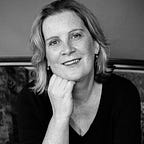A Rooster in Dublin: Thoughts on 2020 America
As a writer and as a white woman and as a naturalized U.S. citizen, I cannot yet write about systemic racism and our police murdering my fellow citizens and residents and documented or undocumented immigrants. I cannot write about a COVID-19 pandemic that, in some U.S. cities, has killed people of color at almost four times the rate that it has killed us white folks.
Not yet. I’m too slow. I’m too sorrowful. I’m too disgusted. I’m too furious.
Plus, I’m too Irish to fast-forward or insta-skip from death to mourning to writing.
So like most of us, this morning I woke to a new re-realization of our shared and sick truths.
Like most of us, this morning I listened to the radio news and checked my social media channels for more news. In a way, I wish I hadn’t.
Speaking of social media, today I decided to only read the posts and links that will actually teach me something, that will compensate for the parts I’ve missed, for the deficits in my historical knowledge and current understanding about race in my adopted country.
Or I’ll only read the posts that give me a new and useful set of steps toward something I can actually get up and do-but only when I’m done mourning and processing. And yes, I realize that mourning and processing are the privilege of the watcher, the bystander.
Meanwhile, I’m going to tell you a story. Now, what this story has to do with systemic and worldwide racism, our COVID-19 pandemic and an America on its knees, I’m not sure.
But for the past week, this is the little story that won’t leave my thoughts.
Enter: That Dublin “Rooster”
Sometime in the late 1950s or early `60s, my uncle and his wife bought a house in a development just north of Dublin’s city center.
A generation earlier, Uncle was raised on the same farm and in the same, thatch-roof farmhouse as my siblings and me. He got a scholarship to a boys’ school (Ireland had no free secondary education until 1967), then attended college, then got a government job and bought that house where he and his wife lived.
One morning, this city-suburban neighborhood woke to the sound of a crowing rooster. Hmm …Odd. Then, after a week of being woken up by this rooster, they looked out their window to see a neighbor in his front garden where he had erected a sign for “farm-fresh” eggs.
The more that cockerel crowed, the more people flocked to that housing estate to buy their weekly eggs.
Everyone was happy until someone discovered that there was no rooster. Instead, behind or inside the egg merchant’s house, there was an amplified cassette tape player and a cassette that played a recording of a crowing rooster.
The eggs? Our man had bought them in bulk at the supermarket and then re-packaged and re-sold them at a marked-up, farm-fresh price.
Our egg merchant had never really lied here. Instead, he had played his rooster cassette and allowed people to deduce that a crowing rooster = backyard chickens = just-laid eggs. He had let people connect the dots to create and believe their own narratives.
From Dublin to 2020 America
Now, almost five decades since I first heard it, I have some random thoughts about this story and how it relates to 2020 America. Please, bear with me here. Or maybe now’s the time to switch on your Netflix.
- We believe what we want to believe, what keeps us comfortable, what makes the world look and sound as wholesome as we want it to be.
- Con artists exploit our desire to trust, our desire to not be conned. Even in these cynical years, we want to believe what the ‘tellers’- the government, the lobbyists, the assorted power brokers-tell us. Are some of them lying or colluding in each other’s lies? These past four years, yes. We have the footage and the facts to prove it. Yet, according to a recent Gallup poll, 49% of us still approve of the way the U.S. presidency is being handled.
- My uncle’s neighbor understood the power of seductive truths and the allure of being part of a shared belief. Equally, when we see a posse of important-looking men in good hair cuts and crisp dress suits standing around a podium, we’ve been conditioned to believe that there must be something real there. Something substantive? Truthful? Adult?
- On some level, our Dublin egg merchant also understood and exploited the self-deceptive power of nostalgia. I mean, what could be more wholesome, more nostalgic than the sounds (rooster) and taste (eggs) of a remembered or imagined Irish countryside? “Make America great again.” Translate: Make America white again or, more accurately, downplay or delete the non-white part of the story. Or make America what you think you remember or got told around the kitchen table or what you and your associates agreed upon as the story.
- Maybe our Dublin man bought his cassette-player and his rooster tape as a social experiment. Or maybe he knew that, even when we know or suspect we’ve been duped, it’s easier to persist in our shared fallacies, our own gullibility, than it is to cop to the flaws and the inhumanity in our long-held belief systems.
So true or not, we spin and preserve our own stories. And maybe this is fine-except when, in order to uphold the story, it all turns to inter-generational mis-truths and righteousness. Then it’s not fine. Neither is it fine when we pirate other families’ stories and histories, then re-cast and re-tell their stories in a way that will both exonerate and profit ourselves.
Now, when is it time to call time? When is it time to finally (pun intended) call foul?
Originally published at http://www.ainegreaney.com.
